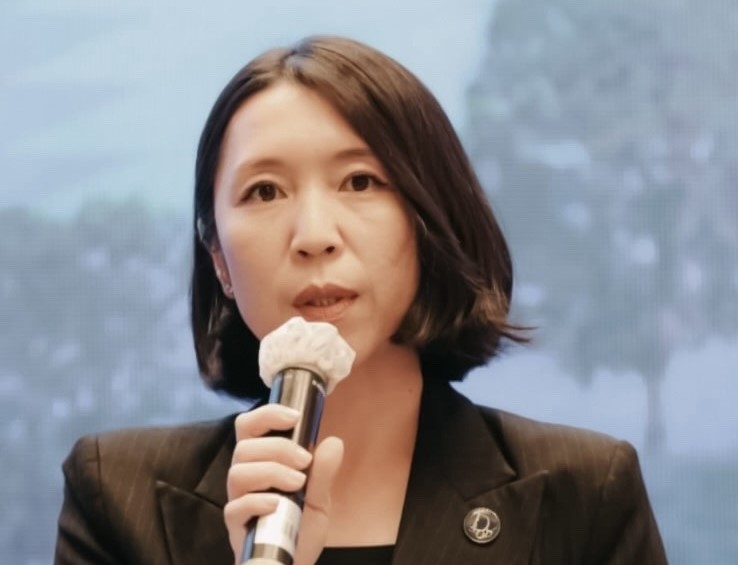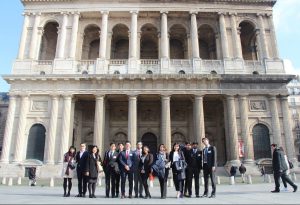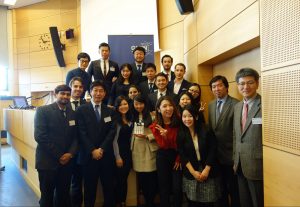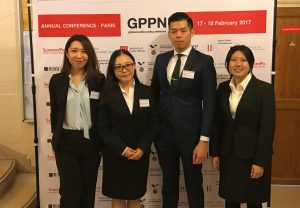What was your purpose in enrolling in GraSPP?
I joined GraSPP with the purpose of enhancing my academics and professional career as a central banker. At a time when I had reached a critical junction in my career, I decided to apply for the Master of Public Policy Program at GraSPP with the view of expanding my horizons and supplementing my experience with world-class education at a renowned university. Undoubtedly, the prestige and reputation of the University of Tokyo played a key role in my decision.
What was attractive or stimulating about GraSPP?
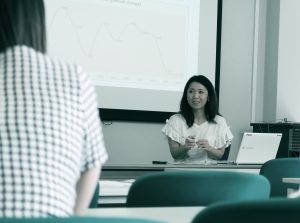
Presentation during an IFI course
GraSPP offers a vibrant, multicultural, and diverse environment, with unique features that make it a place of endless possibilities for me. The courses encompassed a wide range of topics from theoretical and quantitative economics to politics and public health, the student body was a mix of different backgrounds, and the faculty had impressive academic backgrounds and extensive experience in international organizations. In addition, the flexibility of cross-faculty course selection was another advantage of GraSPP that I was happy to leverage.
In short, my studies at GraSPP equipped me with the necessary knowledge to advance my career and broadened my perspective on socio-economic and public policy issues. Thus, during my studies, I found that my ambitions had evolved into a purpose to drive bigger and better changes on a global scale.
Please share your memorable experiences/courses in GraSPP
I have been fortunate enough to have had quite a few experiences at GraSPP that propelled my professional growth and shaped my future career trajectory.
Aside from an excellent core curriculum that perfectly fits my professional and academic needs, the school offers a variety of electives designed to prepare the students for discussing and finding innovative solutions to pressing international issues. One such course was a case study course called the GraSPP Policy Challenge, where students are allocated into teams to come up with creative solutions to one of the UN Sustainable Development Goals. Our team developed a solution to reduce household food waste within the context of UN SDG 12: Responsible Consumption and Production, and we were selected to attend the Global Public Policy Network (GPPN) Conference in Paris, France.
The GPPN is a network of world-renowned public policy graduate schools such as Columbia SIPA, Science Po School of Public Affairs, LSE School of Public Policy, Lee Kwan Yew School of Public Policy of NUS, GraSPP, and more. It was an incredibly eye-opening experience for me to discuss emerging global issues with the brightest minds in the field and to be immersed in an environment that fostered innovation and creativity.
- GraSPPers in Paris
- GPPN members with the GraSPP Dean
- Our team at the GPPN 2017-Ninjin, Zhuola, Aby, Hidemi
Another memorable experience was attending the “Life at an International Financial Institution” course taught by Professor Jerry Schiff and Nishizawa sensei. The course covers the scope and nature of the analytical and written work conducted by IMF employees. This was a pivotal moment for me, as I realized then that I wanted to work at this institution. Six years later, I have achieved this ambition and joined the IMF.
Finally, I was granted the opportunity to work as a teaching assistant for courses such as Statistical Methods, Macroeconomics for Public Policy, and Mathematics for Public Policy. Teaching a subject is another level of learning. It was an incredible learning opportunity and a great way to form a lasting relationship with the faculty. I keep in touch with my professors to this day.
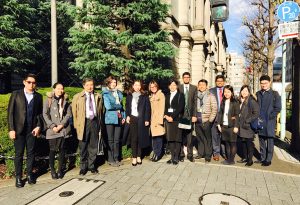
GraSPPers visit BOJ with Nishizawa sensei
What are the advantages of studying in Japan?
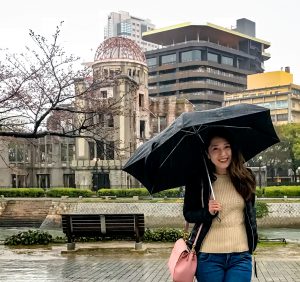
Trip to Hiroshima
Japan is a country that is famous for its standards. Going there, I knew that the quality of my education would be ensured. What surprised me more was the standards people set for themselves and each other. Japanese people are hard-working, have a high sense of integrity and pride, and always keep their word. These aspects of Japanese culture impressed me and taught me how to uphold myself to better standards. The positive personal traits I learned there help me to this day as I navigate through everyday life.
Did the school life at GraSPP affect your career?
Yes, and vice versa. Previous experience at the central bank was certainly helpful in my studies, as I had a solid grasp of real-world issues. After graduating, my experience at GraSPP also enhanced my professional life. I had a fresh, broader perspective on policy issues and was able to make more meaningful contributions to work projects. I was also well-versed in emerging global challenges, such as climate change and sustainable development, which helped shape my current career trajectory.
What has GraSPP meant to your life?
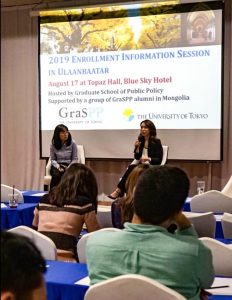
GraSPP outreach event in Ulaanbaatar, Mongolia
GraSPP is the place where eccentric ideas merge to create a synergy, and studying there has been a life-altering experience for me. Every experience has taught me something valuable, challenging, and expanding my worldview. The intermingling of diverse backgrounds, views, and ideas was a recipe for a happy “creative destruction.” I learned to un-learn and adopt an open mindset when approaching critical policy issues.
Any advice or comments for the latent students?
Never let a fixed mindset prevent you from seeing the bigger picture or listening to the brighter idea. GraSPP offers endless opportunities to learn, grow, and step out of your comfort zone. Use your time at GraSPP to the fullest to become a well-rounded policymaker equipped with the skills-set and knowledge to tackle the policy challenges of tomorrow.



